Program length
15 months
Total cost
$7,119
Next Application Period
February 14 – March 14
Locations
See Map
The Radiography Technology program trains students to take images of patients’ bodies using medical imaging equipment, such as X-ray, Fluoroscopy, and C-arm imaging.
Radiologic technologists provide medical providers the images needed to diagnose and treat injuries and diseases. In this program, students are instructed in classroom and laboratory settings to learn on-the-job skills, and then apply that knowledge in a clinical setting. Students will spend over 900 clinical hours completing 36 mandatory competencies, 15 elective competencies, and other requirements set by the ARRT.
Graduates of the Radiography Technology program are prepared to become ARRT licensed radiologic technologists, working in hospitals, clinics, and diagnostic imaging centers
UTAH SYSTEM OF HIGHER EDUCATION (USHE) DESCRIPTION:
In this program, students are instructed in the classroom and laboratory settings to learn on-the-job skills of being an x-ray tech, and then apply that knowledge in a clinical setting. Students will have the opportunity to gain experience in a variety of healthcare settings including – but not limited to – hospitals, urgent care, and family practice clinics. The experience you will gain at your clinical sites will put you on the path to a successful career as a Radiographic Technologist.
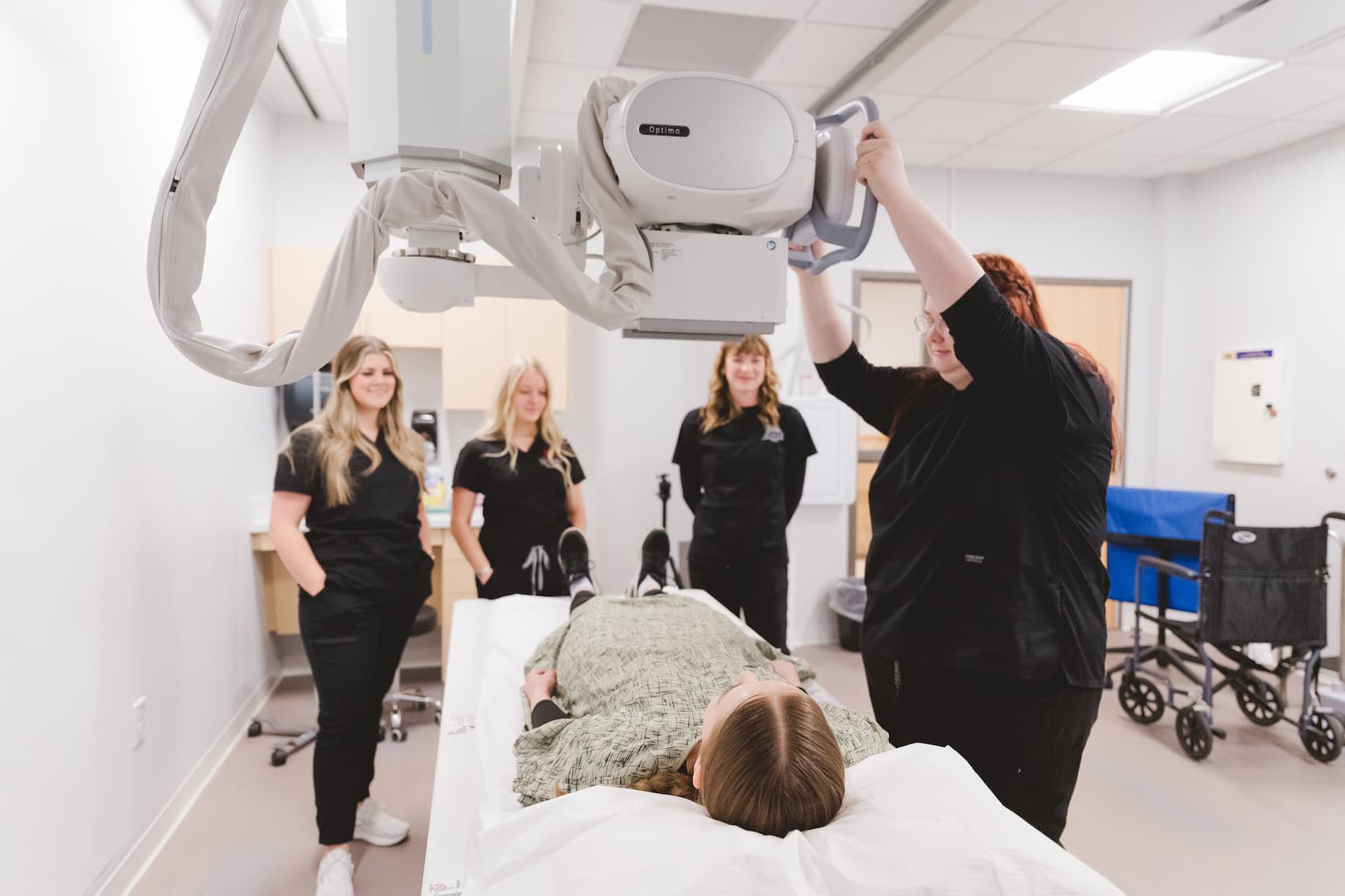
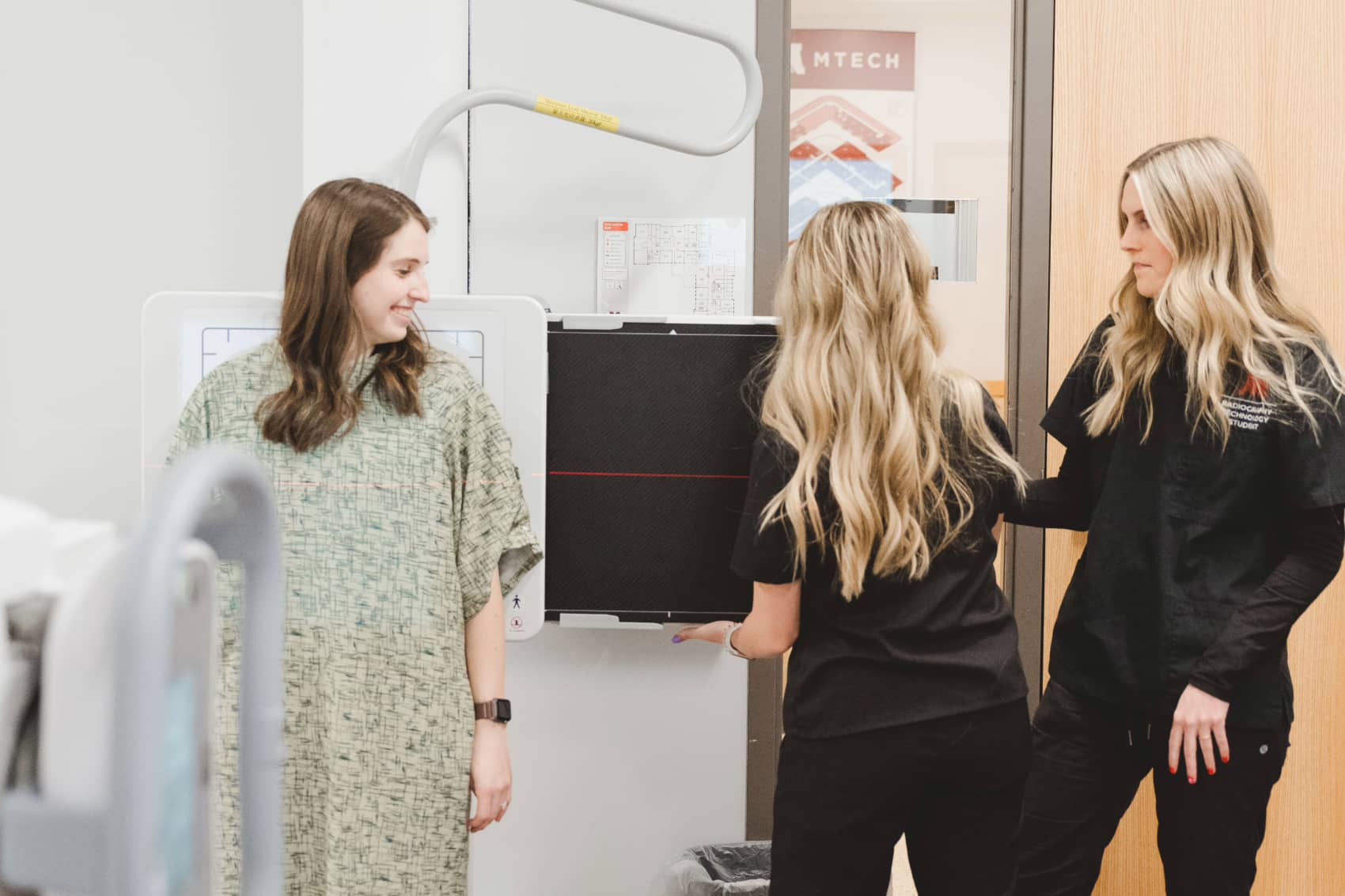
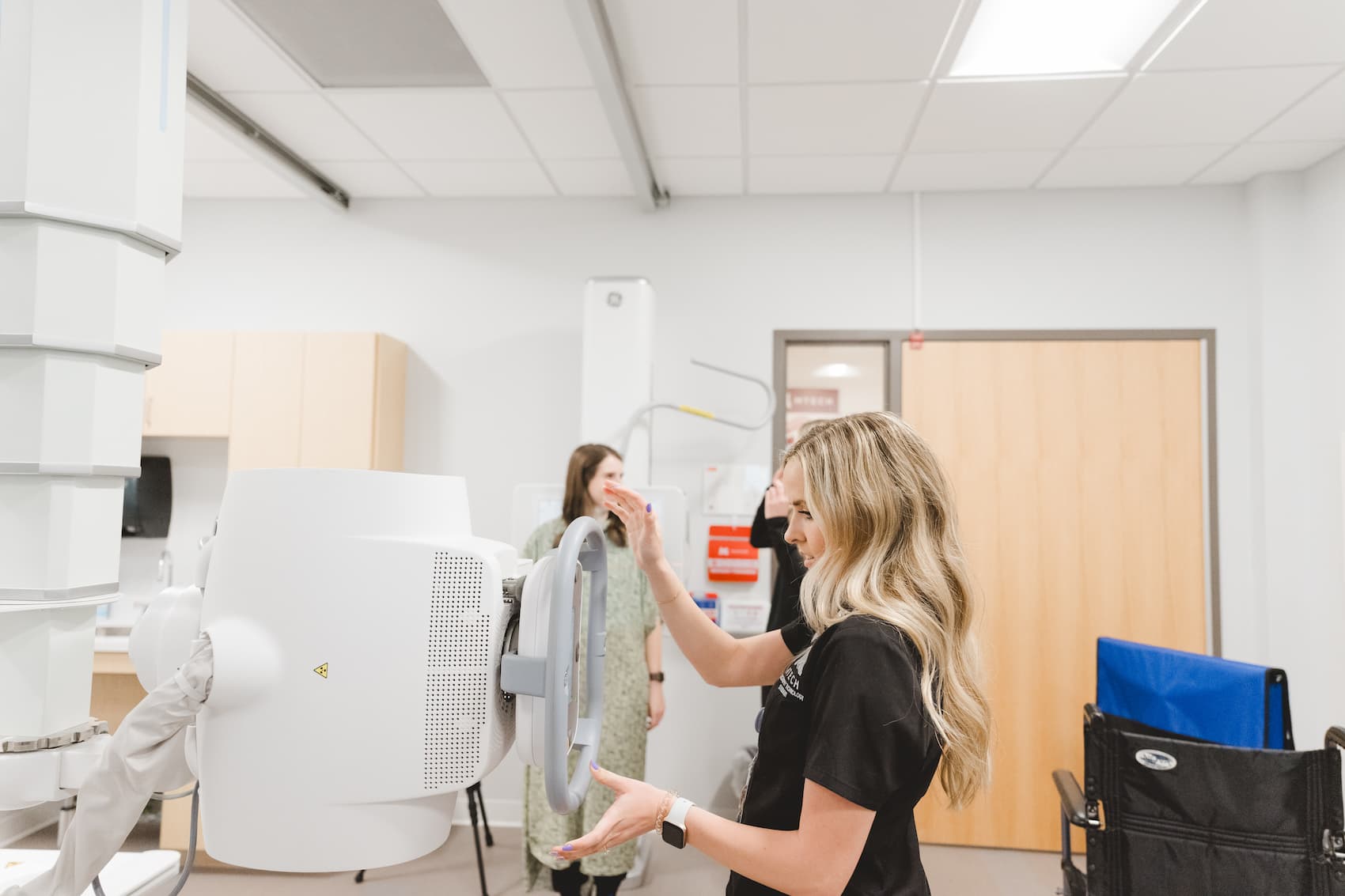
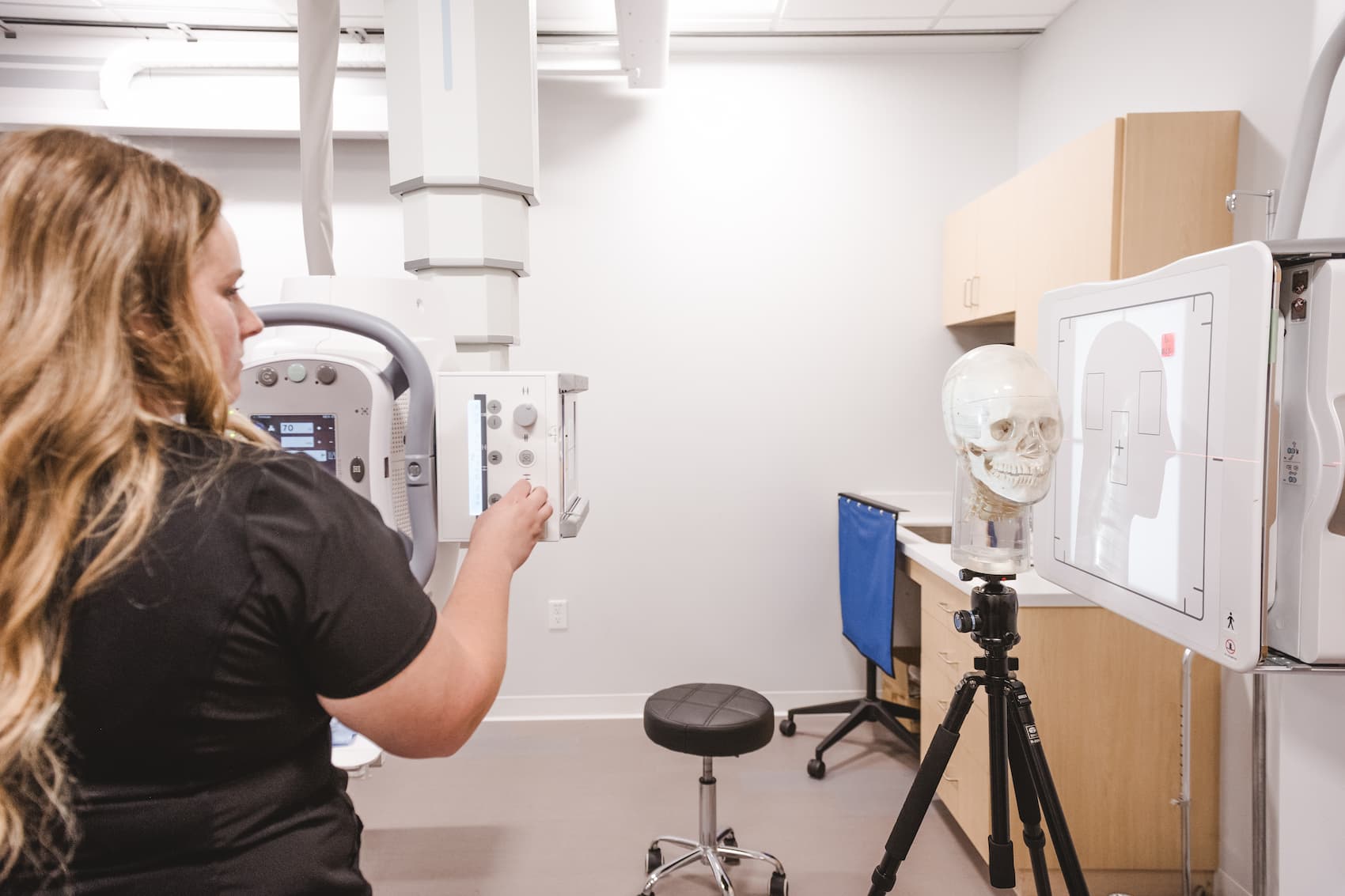
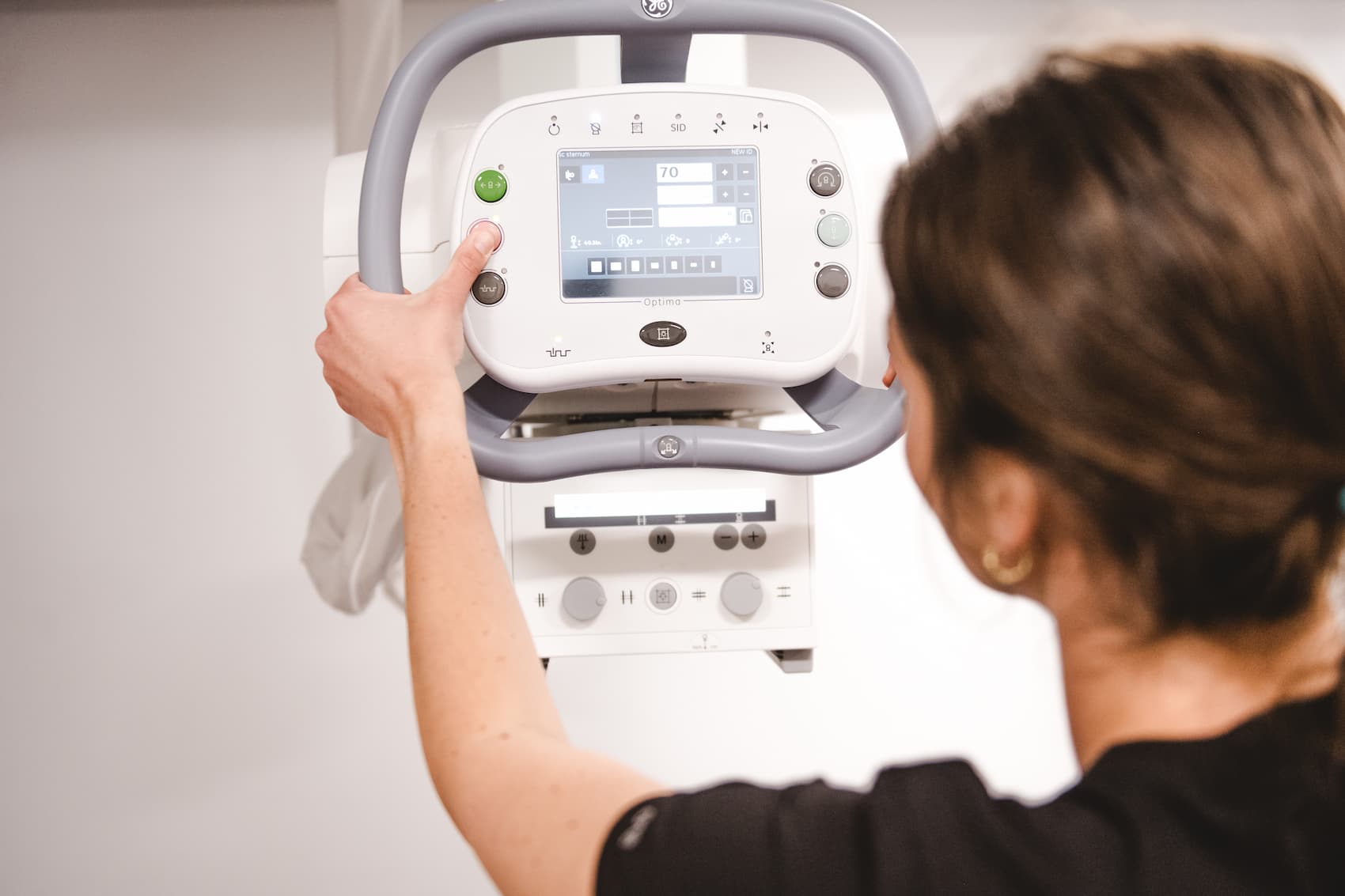
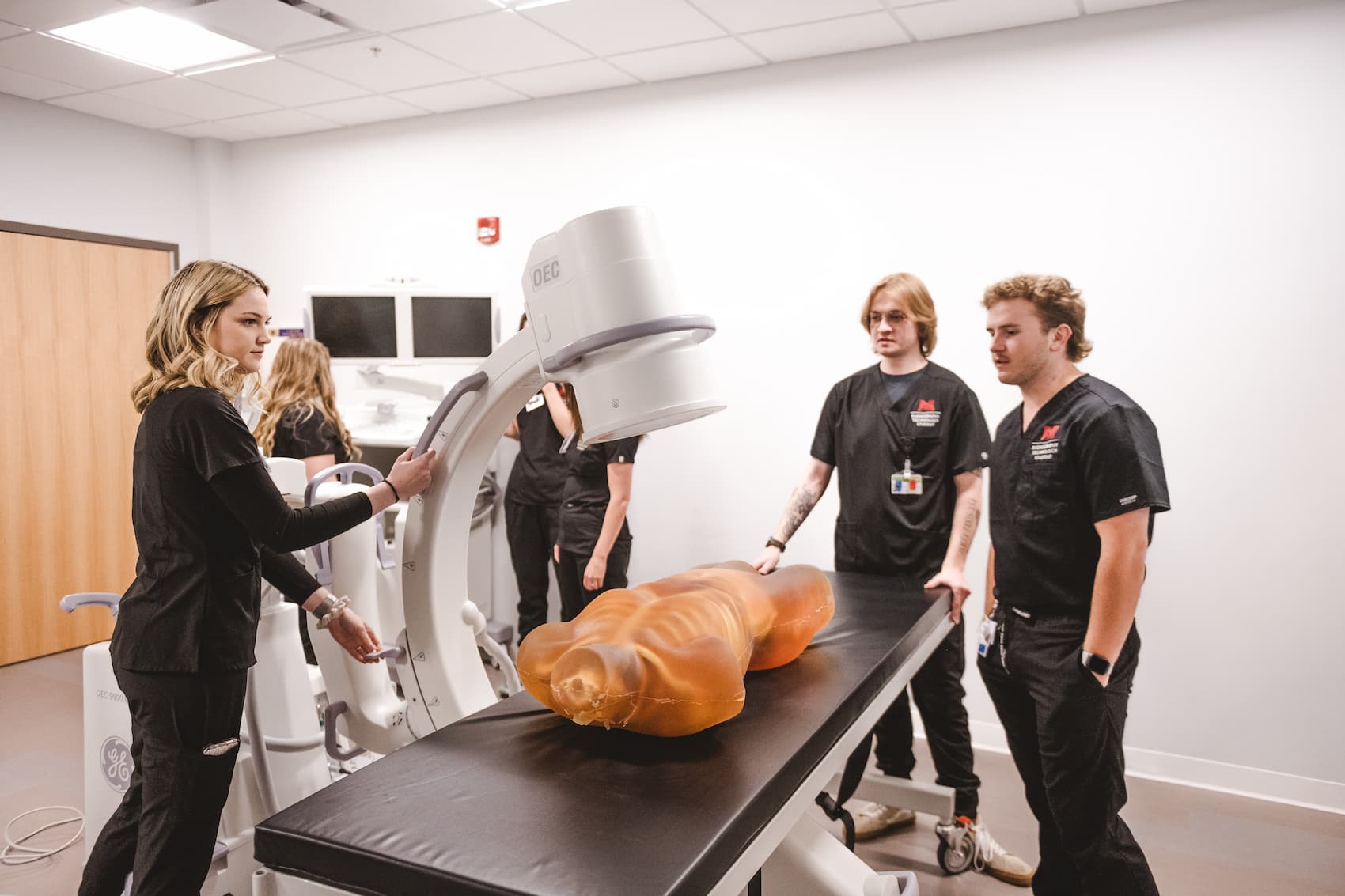
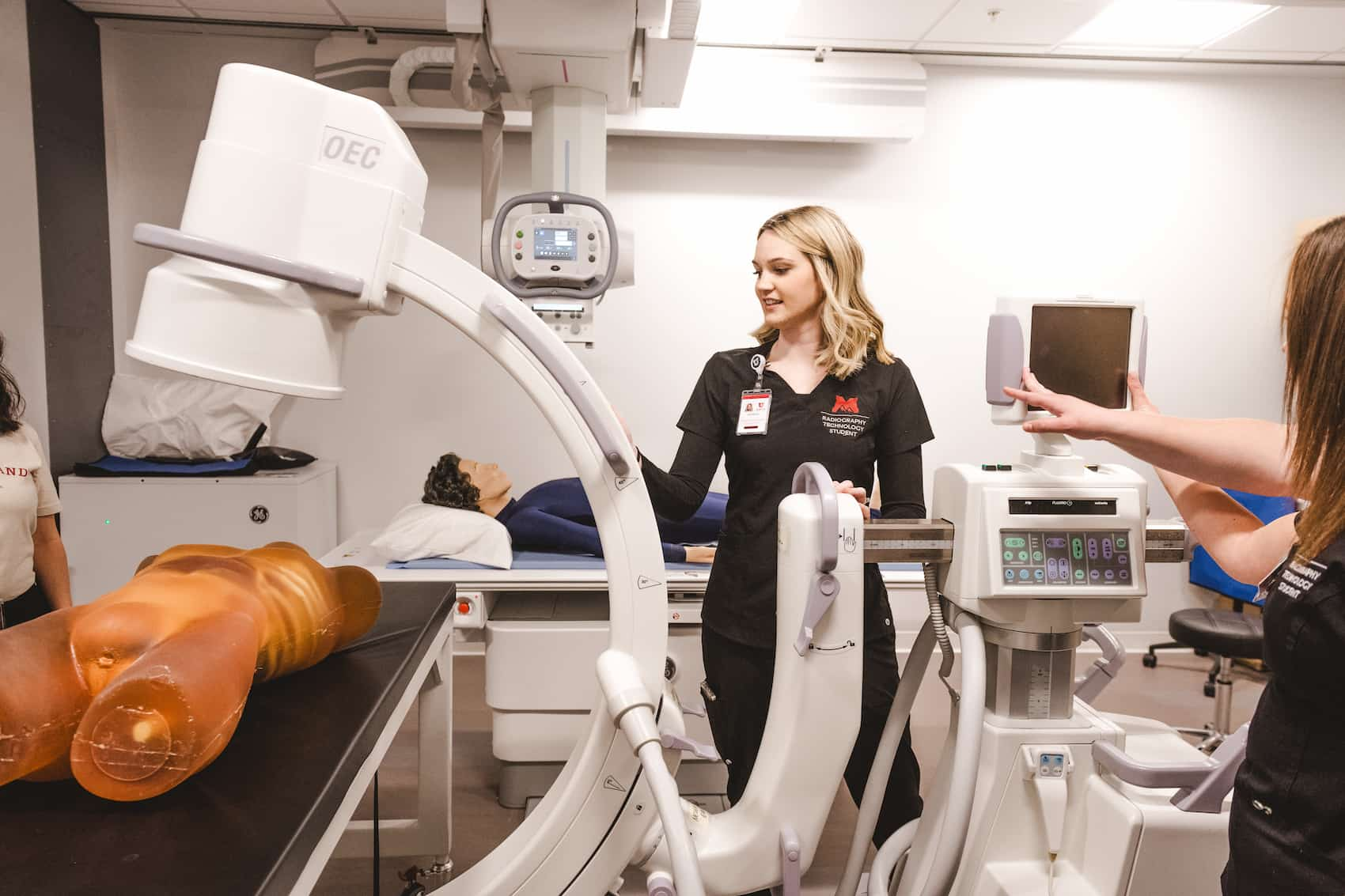
This program is eligible for Financial and Veterans Aid! Learn more
Application is open for submission:
February 13 – March 13 at 4:00 pm.
Classes begin in August and run until November of the following year (15 months). The program has only one start date per year, and students must apply and be admitted to enroll.
Minimum Age Requirement:
18 years old. High school students are not eligible for this program.
All prospective applicants must complete an application and submit it during the open application period. All application submissions are final and cannot be altered after submission. Applications that contain multiple errors, are incomplete, or are not submitted by the deadline will not be considered for review.
Admissions Timeline
February 13 – March 13
April – May
May – June
August
Entrance Assessment
Degree Requirements
A high school diploma or GED is required, along with one of the following degree options:
Mountainland Technical College (MTECH) does not offer Associate or Bachelor’s degrees.
Coursework Requirements
Prerequisite courses are not offered at Mountainland Technical College (MTECH). Applicants must complete all prerequisite coursework at a regionally accredited, degree-granting college or university prior to applying. As a technical college, MTECH does not accept transfer credits or award degrees. We only require applicants to complete our prerequisite requirements to have their application eligible for consideration.
Online versions of the coursework requirements are accepted only if they are completed directly through a degree-granting college or university.
Degree and Coursework Deadline
Applicants may apply to the program while their degree and required anatomy and physiology coursework are still in progress. However, all academic requirements must be completed by the end of June of the application year. As part of the application, applicants must submit an unofficial electronic transcript showing that any outstanding degree or anatomy and physiology coursework is currently in progress.
X-Ray Job Shadowing Requirements
Mountainland Technical College (MTECH) does not arrange or provide shadowing opportunities. Applicants are responsible for contacting healthcare facilities directly to inquire about and arrange their own shadowing experiences.
Immunization Requirements
Accepted students will be required to provide proof of the following immunizations shortly after admission. It is strongly recommended that prospective applicants complete these immunizations before or during the application period.
Applicants who meet all prerequisite requirements are not evaluated based on GPA. The program utilizes a point-based admissions rubric to guide a holistic review. Interview invitations are based on the quality of the applicant’s essays, job shadowing experiences, medical education or certifications, personal and healthcare experiences, professionalism, communication skills, and overall application quality.
See Radiography Technology Admissions Rubric
The program typically receives approximately 150 or more applications each year. Around 30 applicants are invited to a first-round interview, with a smaller group from this pool advancing to a second-round interview with clinical site representatives. 12–16 applicants are offered admission, and some remaining second-round candidates are placed on an alternate list for possible admission if positions become available. The program’s overall acceptance rate is around 9%.
If you are a prospective student interested in receiving occasional announcements throughout the year about our new admissions information sessions, we invite you to complete a brief survey to join our email list using the link below.
Radiography Technology Admissions Information Survey:
https://forms.gle/MwrZRxrVspxCFWjR7
Upcoming Admissions Information Sessions
Prospective applicants are strongly encouraged to attend an Admissions Information Session. Applicants who attend a session within six months of applying will receive five points toward their application score.
Sessions are held at the Mountainland Technical College – Lehi Campus, with the option to attend the session virtually. Please note that sessions will not be recorded or posted afterward. Please complete the Google Form to register for a session. A confirmation email with session details will be sent one day prior to the scheduled session.
Thursday, November 20, 2025 | 1:00 pm – 2:00 pm | Register Here
Friday, December 12, 2025 | 3:00 pm – 4:00 pm | Register Here
Friday, January 23, 2026 | 2:00 pm – 3:00 pm | Register Here
Admissions Advisors
Prospective students can also meet with an MTECH Admissions Advisor to review program details and admission requirements. Meetings are available in person or online. For more information, please visit the Admissions Advisors webpage.
| Term | Campus | Room # | Start Date – End Date | Time | Days |
|---|---|---|---|---|---|
| Fall 2025 | Lehi Building A | 215 | 8/13/2025-TBD | 8:00 am – 2:30pm | Monday-Friday |
| Course Name | Course Hours | Course Credits | Industry Exam Fees | Tuition | Course Fees |
|---|---|---|---|---|---|
| Radiographic Anatomy and Procedures | 90 | 3 | – | $360.00 | $410.00 |
| Radiographic Imaging and Exposure Techniques | 90 | 3 | – | $360.00 | $120.00 |
| Patient Care | 30 | 1 | – | $120.00 | $100.00 |
| Radiography Clinicals I | 270 | 6 | – | $720.00 | $20.00 |
| Radiology Physics | 30 | 1 | – | $120.00 | $165.00 |
| Radiographic Anatomy and Procedures II | 90 | 3 | – | $360.00 | $10.00 |
| Radiographic Imaging II | 60 | 2 | – | $240.00 | $10.00 |
| Radiographic Protection and Radiobiology | 30 | 1 | – | $120.00 | $100.00 |
| Radiography Clinicals II | 270 | 6 | – | $720.00 | $10.00 |
| Radiography and Pediatric Pathology | 30 | 1 | – | $120.00 | $10.00 |
| Radiographic Anatomy & Procedures III | 60 | 2 | – | $240.00 | $70.00 |
| Alternate Modality and Sectional Anatomy | 60 | 2 | – | $240.00 | $10.00 |
| Radiography Clinicals III | 270 | 6 | – | $720.00 | $10.00 |
| Registry Review | 90 | 3 | $225.00 | $360.00 | $10.00 |
| Radiography Clinicals IV | 125 | 2 | – | $240.00 | $10.00 |
Upon registration, you will register and submit payment for the first course in the program.
While not required, you may make a deposit, in person or online, for the full program upon registration to be held in your student account.
| Tuition/Fees | Cost |
|---|---|
| Tuition: | $5,040.00 |
| Registration Fee: | $40.00 |
| Application Fee: | $30.00 |
| Course Fees: | $1,359.00 |
| Required Materials: | $430.00 |
| Total Cost of Program: | $7,119 |
*Total includes tuition, fees, materials, and optional materials.
Course-by-course cost breakdowns can be found on the “Courses” tab above.
Upon registration, you will register and submit payment for the first course in the program. Fees and materials may be required upfront, while some may be paid later throughout the program.
While not required, you may make a deposit, in person or online, for the full program upon registration to be held in your student account.
REQUIRED MATERIALS | NOTES | COST |
|---|---|---|
Bontrager’s Textbook of Radiographic and Related Anatomy, 10th Edition | 9780323653671 | Included in course fees |
Bontrager’s Workbook of Radiographic Positioning and Related Anatomy, 10th Edition | 9780323694230 | Included in course fees |
Bontrager’s Handbook of Radiographic Positioning and Related Anatomy – Pocket Size and Spiral Bound, 10th Edition | 9780323694223 | Included in course fees |
Principles of Radiographic Imaging: An Art and A Science, 6th Edition | 9781337711067 | Included in course fees |
Medical Terminology: A Short Course | 9780323479912 | Included in course fees |
Scrubs | Students will order scrubs through the program store of Logo It On; it is recommended to purchase at least two setS | Cost may vary |
DOPL Application Processing Fee | Paid to DOPL, required for license | $70 |
Lanyard/Badge Holder | $10 | |
HCA Clinical Fee | $10 | |
Rad Tech Boot Camp | $170 | |
Lead Markers | $20 | |
Lab Supplies | $150 |
OPTIONAL Materials | notes | cost |
|---|---|---|
Radiographic Imaging and Exposure, 6th Edition | 9780323661393 | $65 |
Patient Care in Radiography, 10th Edition | 9780323654401 | $40 |
Radiation Protection in Medical Radiography, 9th Edition | 9780323825030 | $45 |
Radiologic Science for Technologists | 9780323661348 | $110 |
MTECH Program Certificate in Radiography Technology
Students are prepared to take the AART National Exam for Radiologic Technologists
Healthcare Provider Basic Life Support (BLS)
Where are your clinical sites located, and how are they assigned to students?
Our clinical sites are located between Murray and Heber City. Clinical placements are determined by the Program Coordinator and the Clinical Site Instructor and Coordinator (CI), based on site availability and the needs of the program.
Each student will be assigned a primary clinical site for the duration of the program. As part of their training, students may also be required to rotate through affiliated hospitals, clinics, and urgent care centers associated with their assigned clinical site. Students should be prepared to travel to any location within the program’s designated service area to complete their clinical requirements.
What are the correct anatomy and physiology courses I need to take?
Anatomy and physiology courses must be taken with the lab portion and within five years of applying to the program. You must receive a B- or higher in each course. Applicants have until June of the year they apply to meet these requirements. Here is an example of the anatomy and physiology courses from some local colleges and universities in Utah that satisfy the prerequisite:
Utah Valley University
Brigham Young University
Salt Lake Community College
University of Utah
Weber State
or
Utah Tech University
Snow College
Where can I find more information about financial aid, veterans benefits, and FAFSA?
Please contact the financial aid office at 801-753-4105 or visit the Financial Aid webpage.
Can I meet to discuss more about the program?
Prospective students can also meet with an MTECH Admissions Advisor to review program details and admission requirements. Meetings are available in person or online. For more information, please visit the Admissions Advisors webpage.
For questions regarding registration, please contact MTECH Student Services at 801-753-6282 or studentservices@mtec.edu
The $30 application fee can be paid in person or over the phone through Student Services.
MTECH Student Services:
801-753-6282
The emailed receipt will be uploaded to the application.
The appplication period is: February 14 - March 14 at 4:00pm (for the Fall start date)
The following documents should be compiled for the application:
Accepted students will be required to complete a background check, drug screen, and provide proof of immunizations.

radtech@mtec.edu
| Cookie | Duration | Description |
|---|---|---|
| cookielawinfo-checkbox-analytics | 11 months | This cookie is set by GDPR Cookie Consent plugin. The cookie is used to store the user consent for the cookies in the category "Analytics". |
| cookielawinfo-checkbox-functional | 11 months | The cookie is set by GDPR cookie consent to record the user consent for the cookies in the category "Functional". |
| cookielawinfo-checkbox-necessary | 11 months | This cookie is set by GDPR Cookie Consent plugin. The cookies is used to store the user consent for the cookies in the category "Necessary". |
| cookielawinfo-checkbox-others | 11 months | This cookie is set by GDPR Cookie Consent plugin. The cookie is used to store the user consent for the cookies in the category "Other. |
| cookielawinfo-checkbox-performance | 11 months | This cookie is set by GDPR Cookie Consent plugin. The cookie is used to store the user consent for the cookies in the category "Performance". |
| viewed_cookie_policy | 11 months | The cookie is set by the GDPR Cookie Consent plugin and is used to store whether or not user has consented to the use of cookies. It does not store any personal data. |